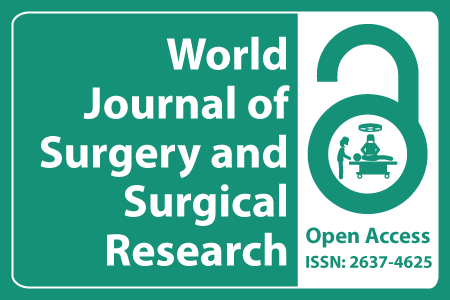
Journal Basic Info
- Impact Factor: 1.989**
- H-Index: 6
- ISSN: 2637-4625
- DOI: 10.25107/2637-4625
Major Scope
- Hand Surgery
- Reconstructive Surgery
- Pediatric Surgery
- Breast Surgery
- Laparoscopic Surgery
- Anesthesiology
- Emergency Surgery
- Cardiothoracic Surgery
Abstract
Citation: World J Surg Surg Res. 2022;5(1):1406.DOI: 10.25107/2637-4625.1406
The Effectivity of Laparoscopic-Dominant Individualized Levator-Ani Resection: A Retrospective Study
Xiajuan Xue, Chao Jian, Yicong Fang, Lixiong Luo, Yinzong Guo, Bijuan Ling and Mingzhi Cai
Department of Colorectal Surgery, Zhangzhou Municipal Hospital Affiliated of Fujian Medical University, China Internal Medicine ICU, Zhangzhou Municipal Hospital Affiliated of Fujian Medical University, China Department of Surgery, Zhangzhou Municipal Hospital Affiliated of Fujian Medical University, China
*Correspondance to: Mingzhi Cai
PDF Full Text Research Article | Open Access
Abstract:
Abstract Objective: To investigate if Laparoscopic-Dominant Abdominoperineal Resection with individualized levator-ani resection (LDAPR) inhibits local recurrence and prolongs survival compared to Laparoscopic Abdominoperineal Resection (APR). Methods: Rectal cancer surgery cases were retrospectively identified from September 2014 to December 2019. LDAPR treated group (55 patients) and the APR-treated group (71 patients) were included in the study. The operation time, Circumferential Resection Margin (CRM), Intraoperative tumor Perforation (IOP), postoperative complications, the two-year overall survival and local recurrence were compared in the two groups. Results: The CRM and IOP were significantly reduced in the LDAPR compared to the APR group (3.6% vs. 16.9%, t=5.522, P=0.019; 3.6% vs. 14.1%, t=3.926, P=0.048). In terms of postoperative complications, the incidence of urinary retention in LDAPR was significantly reduced than the APR group (10.9% vs. 25.4%, χ2=4.139, P=0.041). Similarly, perineal pain at 6 months or 1 year after surgery was significantly down-regulated in LDAPR than in the APR group (72.7% vs. 88.7%, χ2=5.320, P=0.021; 18.2% vs. 43.2%, χ2=8.288, P=0.004. However, there was no statistically significant difference in the postoperative complications between the LDAPR and APR groups. Finally, LDAPR led to a significantly improved two-year overall survival and a reduced local recurrence compared to APR. Conclusion: LDAPR reduce CMR, IOP, and local recurrence and simplified the perineum operation, subsequently protecting the pelvic autonomic nerves. Compared to the conventional APR, LDAPR is a promising procedure worth adopting for rectal cancer treatment.
Keywords:
Keywords: Abdominoperineal resection; Individualized levator-ani resection; Local recurrence; Low rectal cancer
Cite the Article:
Xue X, Jian C, Fang Y, Luo L, Guo Y, Ling B, et al. The Effectivity of Laparoscopic-Dominant Individualized Levator-Ani Resection: A Retrospective Study. World J Surg Surgical Res. 2022; 5: 1406..













